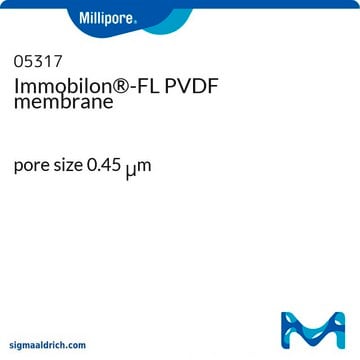GE10600023
Amersham™ Hybond® P Western blotting membranes, PVDF
pore size 0.45 μm, roll W × L 300 mm × 4 m, pkg of 1 ea
Synonym(s):
Amersham PVDF membrane
Sign Into View Organizational & Contract Pricing
All Photos(1)
About This Item
UNSPSC Code:
41105339
NACRES:
NB.22
Recommended Products
packaging
pkg of 1 ea
manufacturer/tradename
Cytiva 10600023
roll W × L
300 mm × 4 m
pore size
0.45 μm pore size
Looking for similar products? Visit Product Comparison Guide
General description
PVDF membranes have higher mechanical strength than NC membranes and, thus, are more suitable for Western blotting applications where stripping and reprobing is needed. In addition, PVDF membranes exhibit higher protein binding capacity, however, with a tendency for a higher background, compared with NC membranes.
Features and Benefits
- For use with standard colorimetric and chemiluminescent detection methods for proteins of > Mr 20 000
- Offers high physical strength for easy signal detection
- Provides high protein retention even after harsh washing steps
- Captures high protein during transfer reduces the loss of sample
- Available in precut sizes for laboratory uses
Storage and Stability
Please be aware this product may be shipped 90 days before the expiration date. For more information on the batch specific expiration date, please contact technical service.
Legal Information
Amersham is a trademark of Cytiva
Hybond is a registered trademark of Cytiva
Certificates of Analysis (COA)
Search for Certificates of Analysis (COA) by entering the products Lot/Batch Number. Lot and Batch Numbers can be found on a product’s label following the words ‘Lot’ or ‘Batch’.
Already Own This Product?
Find documentation for the products that you have recently purchased in the Document Library.
Customers Also Viewed
Ousamah Younoss Soliman et al.
Journal of pharmaceutical sciences, 109(4), 1581-1593 (2020-01-01)
Messenger RNA (mRNA)-containing nanoparticles were produced by electrostatic complexation with a library of pharmaceutical grade chitosans with different degrees of deacetylation and hyaluronic acids (HAs) (native vs. sulfated). Polymer length (Mn), HA degree of sulfation (DS), and amine to phosphate
Jedediah Seltzer et al.
Journal of virology, 94(10) (2020-03-13)
Kaposi sarcoma-associated herpesvirus (KSHV) is necessary but not sufficient for primary effusion lymphoma (PEL) development. Alterations in cellular signaling pathways are also a characteristic of PEL. Other B cell lymphomas have acquired an oncogenic mutation in the myeloid differentiation primary
Narjes Khatoun Shabani Sadr et al.
Biochemical genetics, 58(6), 883-900 (2020-07-02)
Sialic acid (N-acetylneuraminic acid, NANA) is found at all cell surfaces of vertebrates. Although it is widely accepted that sialic acid is an essential substrate for brain development via a significant role in nerve transfers, structure of glycosides, and synaptogenesis
Massimo Venditti et al.
Animals : an open access journal from MDPI, 11(1) (2021-01-14)
Herein is reported the first evidence of the protective role of D-aspartic acid (D-Asp) in preventing the toxic effect exerted by the alkylating agent ethane dimethane sulfonate (EDS) in the rat testis. We confirmed that EDS treatment specifically destroyed Leydig
Lisa Mayr et al.
Nature communications, 11(1), 1775-1775 (2020-04-15)
The increased incidence of inflammatory bowel disease (IBD) has become a global phenomenon that could be related to adoption of a Western life-style. Westernization of dietary habits is partly characterized by enrichment with the ω-6 polyunsaturated fatty acid (PUFA) arachidonic
Our team of scientists has experience in all areas of research including Life Science, Material Science, Chemical Synthesis, Chromatography, Analytical and many others.
Contact Technical Service





